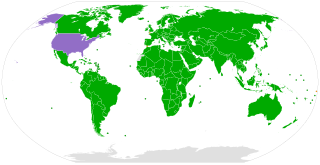
The European Convention on Human Rights is an international convention to protect human rights and political freedoms in Europe. Drafted in 1950 by the then newly formed Council of Europe, the convention entered into force on 3 September 1953. All Council of Europe member states are party to the convention and new members are expected to ratify the convention at the earliest opportunity.

The International Labour Organization (ILO) is a United Nations agency whose mandate is to advance social and economic justice by setting international labour standards. Founded in October 1919 under the League of Nations, it is one of the first and oldest specialised agencies of the UN. The ILO has 187 member states: 186 out of 193 UN member states plus the Cook Islands. It is headquartered in Geneva, Switzerland, with around 40 field offices around the world, and employs some 3,381 staff across 107 nations, of whom 1,698 work in technical cooperation programmes and projects.

The United Nations Convention on the Rights of the Child is an international human rights treaty which sets out the civil, political, economic, social, health and cultural rights of children. The convention defines a child as any human being under the age of eighteen, unless the age of majority is attained earlier under national legislation.
Labor rights or workers' rights are both legal rights and human rights relating to labor relations between workers and employers. These rights are codified in national and international labor and employment law. In general, these rights influence working conditions in the relations of employment. One of the most prominent is the right to freedom of association, otherwise known as the right to organize. Workers organized in trade unions exercise the right to collective bargaining to improve working conditions.

The International Convention on the Protection of the Rights of All Migrant Workers and Members of Their Families is a United Nations multilateral treaty governing the protection of migrant workers and families. Signed on 18 December 1990, it entered into force on 1 July 2003 after the threshold of 20 ratifying States was reached in March 2003. The Committee on Migrant Workers (CMW) monitors implementation of the convention, and is one of the seven UN-linked human rights treaty bodies. The convention applies as of September 2023 in 59 countries.
Sickness Insurance (Agriculture) Convention, 1927 is an International Labour Organization Convention.
The Freedom of Association and Protection of the Right to Organise Convention (1948) No 87 is an International Labour Organization Convention, and one of eight conventions that form the core of international labour law, as interpreted by the Declaration on Fundamental Principles and Rights at Work.
The Right to Organise and Collective Bargaining Convention (1949) No 98 is an International Labour Organization Convention. It is one of eight ILO fundamental conventions.
Maintenance of Migrants' Pension Rights Convention, 1935 (shelved) is an International Labour Organization Convention.
The Convention concerning the Right of Association and the Settlement of Labour Disputes in Non-Metropolitan Territories is an International Labour Organization Convention on the rights of workers in non-metropoliton territories to form and be active in labour unions.
Migrant Workers Convention, 1975, or Convention concerning Migrations in Abusive Conditions and the Promotion of Equality of Opportunity and Treatment of Migrant Workers is an International Labour Organization Convention for the rights of migrant workers. However unlike the United Nations Convention on the Protection of the Rights of All Migrant Workers and Members of Their Families, there are restrictions of migrant worker to be applied on Article 11.
Maintenance of Social Security Rights Convention, 1982 is an International Labour Organization Convention.
Night Work Conventions are International Labour Organization Convention conventions regulating the rights of night workers. They were specifically aimed at young persons, women or people in specific types of employment and conceived between 1919 and 1948. A more general instrument was signed in 1990.
Part-Time Work Convention, 1994 is an International Labour Organization Convention for protection of part-time workers including the rights to equal pay for equal work.
Home Work Convention, created in 1996, is an International Labour Organization (ILO) Convention, which came into force in 2000. It offers protection to workers who are employed in their own homes.
There are few trade unions in Oman, established following a 2006 Decree by the Sultan of Oman permitting their organization. Some of these, have done completed elections, they are members of the General Federation of Oman Trade Union (GFOTU). Oman has become the third Gulf Arab state, after Bahrain and Kuwait, to have a general federation of trade unions.
Qatar has been a member of the International Labour Organization since 1972, but has not ratified the Freedom of Association and Protection of the Right to Organise Convention, 1948, or the Right to Organise and Collective Bargaining Convention, 1949.

The timeline of young peoples' rights in the United States, including children and youth rights, includes a variety of events ranging from youth activism to mass demonstrations. There is no "golden age" in the American children's rights movement.
International labour law is the body of rules spanning public and private international law which concern the rights and duties of employees, employers, trade unions and governments in regulating Work and the workplace. The International Labour Organization and the World Trade Organization have been the main international bodies involved in reforming labour markets. The International Monetary Fund and the World Bank have indirectly driven changes in labour policy by demanding structural adjustment conditions for receiving loans or grants. Issues regarding Conflict of laws arise, determined by national courts, when people work in more than one country, and supra-national bodies, particularly in the law of the European Union, have a growing body of rules regarding labour rights.

The right to sit refers to laws or policies granting workers the right to be granted suitable seating at the workplace. Jurisdictions that have enshrined "right to sit" laws or policies include Mexico, France, Spain, Argentina, the United Kingdom, Jamaica, South Africa, Eswatini, Cameroon, Tanzania, Uganda, Lesotho, Malaysia, Brazil, Israel, Ireland, Zambia, Guyana, the Indian states of Tamil Nadu and Kerala, the Canadian province of Newfoundland and Labrador, and the British overseas territory of Gibraltar and Montserrat. Almost all states of the United States and Australia, as well as the majority of Canadian provinces, passed right to sit legislation for women workers between 1881 and 1917. US states with current right to sit legislation include California, Florida, Massachusetts, Montana, New Jersey, New York, Oregon, Pennsylvania, West Virginia, and Wisconsin. A right to sit provision is included in the International Labour Organization's Hygiene Convention, 1964; the international treaty being ratified by 52 countries as of 2023. EU-OSHA recommends suitable seating as a best practice. Local jurisdictions with right to sit laws include Portland, Oregon, St. Louis, Missouri, and London's Royal Borough of Kensington and Chelsea.





